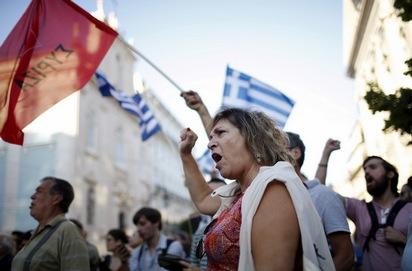Σε ένα πρόσφατο άρθρο στο Foreign Affairs [1], έγραψα ότι, στις διαπραγματεύσεις για το ελληνικό πακέτο διάσωσης, ο Έλληνας πρωθυπουργός Αλέξης Τσίπρας θα ήταν πιθανόν να υπογράψει την προτεινόμενη από την ΕΕ συμφωνία για το χρέος και το ελληνικό κοινοβούλιο να επικυρώσει την συμφωνία. Ο λόγος; Η ομοφωνία όσων λαμβάνουν αποφάσεις εντός της ΕΕ και ο έλεγχος της ΕΚΤ επί της ρευστότητας των ελληνικών τραπεζών δίνουν το πάνω χέρι στην ΕΕ.

Διαδηλωτές φωνάζουν συνθήματα κατά της λιτότητας στην διάρκεια διαδήλωσης για την στήριξη της ελληνικής κυβέρνησης στην Λισαβόνα, στην Πορτογαλία, στις 22 Ιουνίου 2015. RAFAEL MARCHANTE / REUTERS
Καθώς γράφω αυτό το δεύτερο κείμενο (στις 23 Ιουνίου 2015), δεν ξέρω αν οι προβλέψεις μου ήταν ακριβείς. Υπάρχει ακόμα μεγάλη αβεβαιότητα σχετικά με το αν η Ελλάδα θα αποδεχθεί ή θα απορρίψει την τρέχουσα προσφορά της ΕΕ (η οποία μπορεί να είναι ελαφρώς τροποποιημένη) ή, αντί για αυτό θα παρατείνει την αγωνία της, και του κόσμου, με το να πάρει μια ακόμα παράταση.
